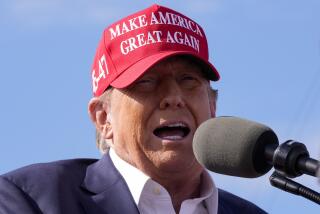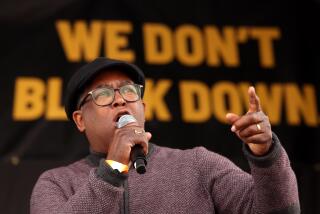Contributions to Clinton’s Legal-Bills Fund Plummet
- Share via
WASHINGTON — Even as big-money donations to the Democratic Party last year sparked controversies that continue to spread, the fund that helps pay President Clinton’s legal bills got barely a trickle.
The Presidential Legal Expense Trust, which defrays assorted legal costs for the president and First Lady Hillary Rodham Clinton, accepted just $62,045 in the last half of 1996, a sharp plunge that leaves the first couple owing their lawyers more than $2.2 million, trustees reported Thursday.
All told, the fund had just $94,066 in cash at the end of last year. Donations in the early part of the year had been far greater but many contributions proved so dubious that the trustees mailed them back. In December, the fund announced that it had rejected more than $600,000 in questionable donations, most of it delivered by Yah Lin “Charlie” Trie, a friend of Clinton’s from Little Rock, Ark.
“We’re all disappointed, given the magnitude of the legal fees, that more money hasn’t come in,” said Michael H. Cardozo, executive director of the trust.
“I believe that the president is painfully aware” of the fund’s poor financial shape, White House Press Secretary Mike McCurry said Thursday.
Cardozo and others involved with the fund pointed out repeatedly at a briefing that the defense fund does not solicit contributions, a marked contrast to aggressive solicitations by the Democratic National Committee during the 1996 election campaign. The fund also set stringent guidelines for the money it accepts.
Thursday’s report underscored the weighty financial burden faced by Clinton and his wife, primarily because of legal bills arising from a special counsel’s investigation of their roles in the Whitewater real estate venture in Arkansas while Clinton was governor and related controversies as well as the Paula Corbin Jones sexual-harassment lawsuit against the president.
Indeed, the prospect of a heavy legal burden has come to affect the way Clinton looks at his future after he leaves the White House. Clinton has pointed out that “he’s young and vigorous and expects to be an employable ex-president, and he expects to honor his obligation to pay those bills,” McCurry said. “And he’s said that in the past and that remains his view.”
The president and first lady have paid $766,134 in fees to four law firms, with the largest share--$695,000--to the Washington firm of Williams & Connolly for Whitewater-related representation. Most of their unpaid bills also are owed to Williams & Connolly.
The defense fund, established in 1994, initially enjoyed success attracting support, according to figures provided by its trustees. Donations exceeded $608,000 during the second part of that first year, for instance. But by the last half of 1996, the amount accepted had shrunk almost tenfold.
Even during the first half of 1996, receipts totaled more than three times the amount accepted for the second half.
Under the rules Clinton’s defense fund set for itself, contributions must be made voluntarily by individuals, using their own personal funds, and cannot exceed $1,000 a year.
Concerns among the fund’s managers that Trie, the Clinton friend from Arkansas, had violated these rules led to the return of $463,000 that he delivered to them in March 1996. Some of those donations raised suspicions because they were in sequentially numbered money orders from different parts of the country. Also, different contributions appeared to bear the same handwriting. The money was returned a few months later.
Cardozo on Thursday said that he informed Mrs. Clinton on April 4 that if $463,000 were to be returned, the donors’ names would not be made public, reflecting the fund’s policy not to embarrass would-be contributors.
He was responding to questions about the notes of former White House Deputy Chief of Staff Harold M. Ickes, who attended the briefing of Mrs. Clinton. The White House released Ickes’ notes this week. They state: “Don’t report names if $ are returned.”
According to the new report, 331 people contributed the $62,045 in the second half of 1996, averaging about $187 per contributor.
More to Read
Get the L.A. Times Politics newsletter
Deeply reported insights into legislation, politics and policy from Sacramento, Washington and beyond. In your inbox twice per week.
You may occasionally receive promotional content from the Los Angeles Times.










